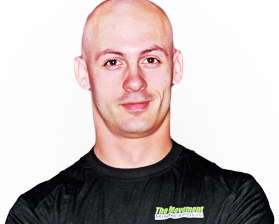
This morning I kicked back and read a fantastic piece by my friends Steven & Omar of Habitry on the issues with nudging. It’s a very long piece, which you’ll dig if you’re into behavior, habits, and that kind of thing. But if not I’ll summarize it very briefly.
Nudging is the idea that you can, basically through psychological trickery, nudge people towards decisions that are better for them. Whether that strikes you as a very reasonable premise or a really fucking stupid one depends on your background in ethics, logic, philosophy, psychology, history, and so on. But it’s safe to say that nudging is pretty problematic.
There are all kinds of pop behavioral psychology books and articles out there (that are fun to read, but not very rigorous) used to both explain why people do what they do, and used as frameworks to change what people do. Most of it is, you pretty quickly learn, is total bullshit. Sure you can come up with discrete scenarios where people pretty reliably do the same weird things, contrary to their own self-interest or whatever, but none of it reliably tells us why people do what they do, and how they can do what they really want to do.
That’s because you don’t know what you really want. This is conundrum has puzzled writers and philosophers since we have records of people thinking about things. You think you do, but trust me, you don’t. And you’ve got all sorts of justifications and rationales for why you think you do.
But if you don’t even really know what you want, what are you doing every day? What’s the point?
Well, look, I obviously don’t have this figured out or I’d collect a Nobel prize of my own, but I think there’s an approach you can take that might help.
Do you believe that Dwayne Johnson was always going to be The Rock? I do. Not in any sort of predestination sense at all. But, The Rock obviously has certain genetic or otherwise gifts that he has discovered, and cultivated to become who he is. I just don’t think think The Rock was ever going to be a 95-lb computer hacker.
I think if you look at what really successful, seemingly fulfilled (because who knows, really) people have in common it’s never a morning routine or a productivity hack (because all that stuff is bullshit) but you can almost always draw a straight line between what they were obviously gifted to do and what they actually did.
In other words, it’s not that they won out in the battle of their rational-analytical-ideal self against the impulsive devil on their shoulder – it’s that they more often than not followed themselves towards what would naturally be a virtuous cycle.
I think, and maybe I’ll turn out to be wrong but it seems to be working out pretty well for me, that this principle is bigger than “success” or fulfillment or whatever we might call that sort of end state where you feel pretty good about things. I think this principle of doing what is best for you applies to everything.
So how do you figure out what’s right?
Well, what if you test it? Of course with something as discrete as exercise you can simply test it with biofeedback and see what your body’s response is. If it makes you better, it must not be going against what is best for you. If it makes you worse, maybe don’t do it?
Since exercise and movement is just a stimulus, really you can test anything that is a stimulus. I’ll let you experiment with that.
But what if big picture you approach everything with an experimental mindset?
“How does the ketogenic diet work for me? I don’t know let me try it for 6 weeks.”
“OK that didn’t seem to work very well, let me try a Ray Peat style diet.”
“I’ve always wanted to try archery, do I have any natural ability?”
What if instead of being nudged around by some benevolent philosopher king, or worse, or trying to find a framework that allows you to rationalize why you don’t always do what you think you should want to do if you really wanted what you think you want, what if you just led yourself?
What if given the decision between vegging out with Netflix and going to the gym for a workout there actually is an empirically correct choice, and sometimes it actually is Netflix?
Let’s say you have a goal to deadlift double your bodyweight, but the pull of your favorite TV series is pretty strong.
What if you tied in this idea, and just asked “Can I do the deadlift workout today?”
Maybe the answer is “no.” And it’s consistently no. Well maybe at some point you revisit this experiment, and try a new one with a goal that comes up “yes” sometimes. What if you don’t have to wrestle with your own rationalizations, if you’re just doing what seems to come easy?
With a bunch of experimentation, a little intuition, and a pinch of luck I think you have a pretty good chance of teasing out what actually IS best for you. No nudging required.


Leave a Reply